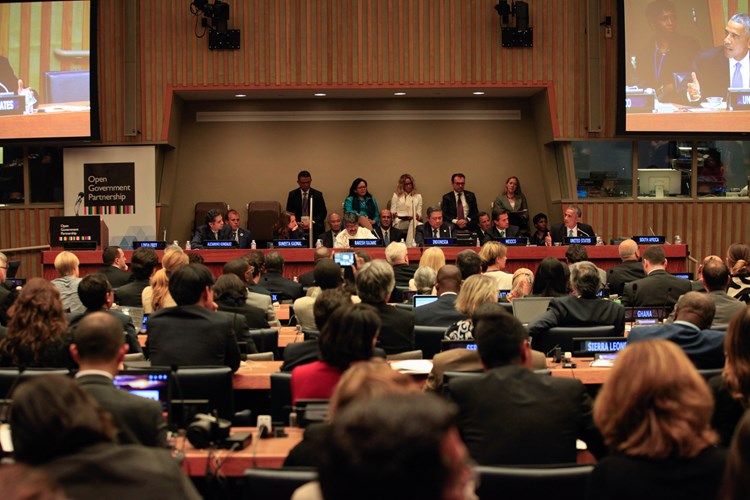Open Government Partnership
Open Government Partnership
The Open Government Partnership is a new multilateral initiative that aims to secure concrete commitments from governments to promote transparency, empower citizens, fight corruption, and harness new technologies to strengthen governance. In the spirit of multi-stakeholder collaboration, OGP is overseen by a steering committee of governments and civil society organizations that together guide the ongoing development and direction of OGP, maintaining the highest standards for the initiative and ensuring its long-term sustainability.
To become a member of OGP, participating countries must embrace a high-level Open Government Declaration, deliver a country action plan developed with public consultation and commit to independent reporting on their progress going forward.
The Open Government Partnership formally launched on September 20, 2011, when the 8 founding governments (Brazil, Indonesia, Mexico, Norway, Philippines, South Africa, United Kingdom, United States) endorsed an Open Government Declaration, and announced their country action plans. Since September, OGP has welcomed the commitment of 47 additional governments to join the Partnership.
__________________________________________________________________________________________________________
OGP in the Republic of Croatia
As a member of the global Open government partnership initiative, the Republic of Croatia has shown its commitment to supporting the principles of transparency, fight against corruption, empowering citizens, and using the advantages of modern technology in order to make public authority bodies more efficient and accountable on all levels as well as to create prerequisites for more efficient and innovative public service provision and public resource management.
Values on which efforts of countries members of Open Government Partnership are based, are entirely complementary to the values which Croatia has committed to during the process of joining the European Union while devoting many years of hard work to fulfilling the requirements for reforms and harmonisation on all levels of social, political and economic activity.
By joining the global Open Government Partnership initiative in September 2011, Croatia accepted the obligation to draft its National Action Plan and present it to other countries, members of the initiative, at the annual conference in April 2012. In order to provide information and advice but also encourage the active participation of civil society and interested members of the public in drafting the Action Plan, public discussions were organised in September 2011 and January 2012. The discussions focused on main achievements and challenges in strengthening the openness of public authority bodies. Furthermore, during preparatory activities for drafting the Action Plan, public consultations were conducted and civil society organisations were given the opportunity to equally participate in all stages of its development. Such approach is in line with the Government objective of introducing a new approach to establishing co-operation between state administration bodies, citizens and civil society in order to open the space for united action in creating, implementing and supervising the policies which have direct impact on the citizens. This approach aims to encourage transparency and openness of public authority bodies and involve citizens and civil society in shaping public policy.
On April 5, the Government of the Republic of Croatia adopted the Action Plan for implementing OGP initiative in Croatia until the end of 2013.
Bearing in mind the contents of the discussions with the representatives of the interested public and civil society organisations, which are active in the areas to which Partnership pertains, but also with respect to the objectives set out in the Government Programme for 2011-2015, more efficient public resource management was recognized as a priority challenge in Croatia’s Action Plan. In this context, special attention will be given to strengthening fiscal transparency. This implies openness towards the public concerning the structure and functions of authorities, fiscal policy objectives, public sector account and projections. This includes unhindered access to reliable, comprehensive, timely, comprehensible and internationally comparable information about the Government activities so that both the electorate and the financial markets can accurately assess the financial position, actual expenses and benefits that the Government activities yield including their present and future economic and social implications.
Useful links:
